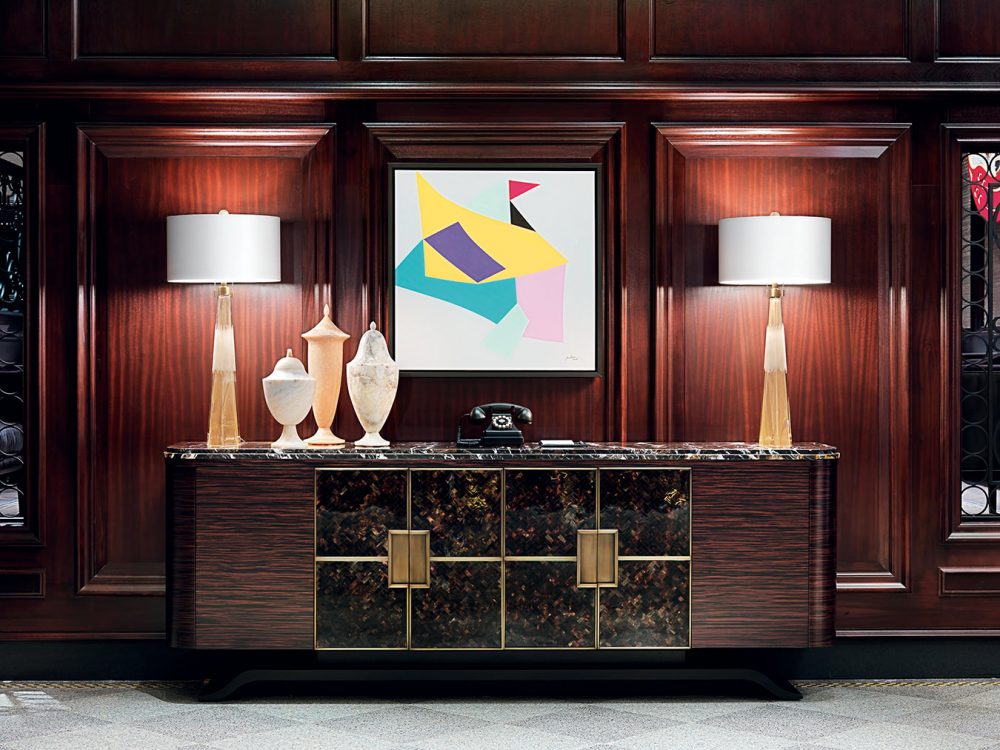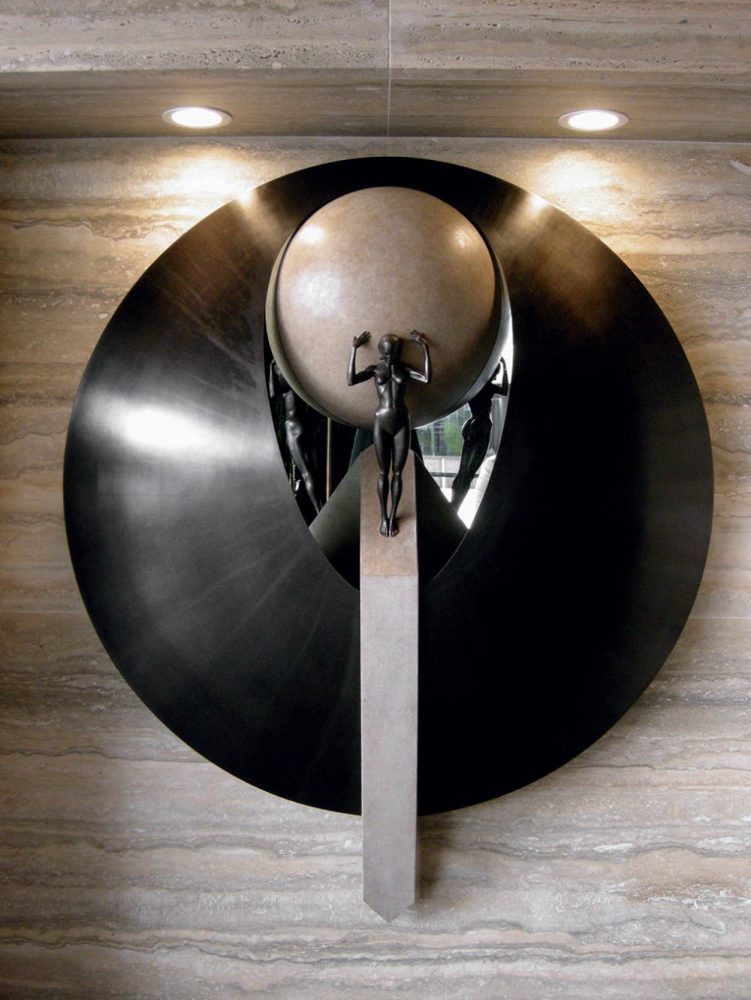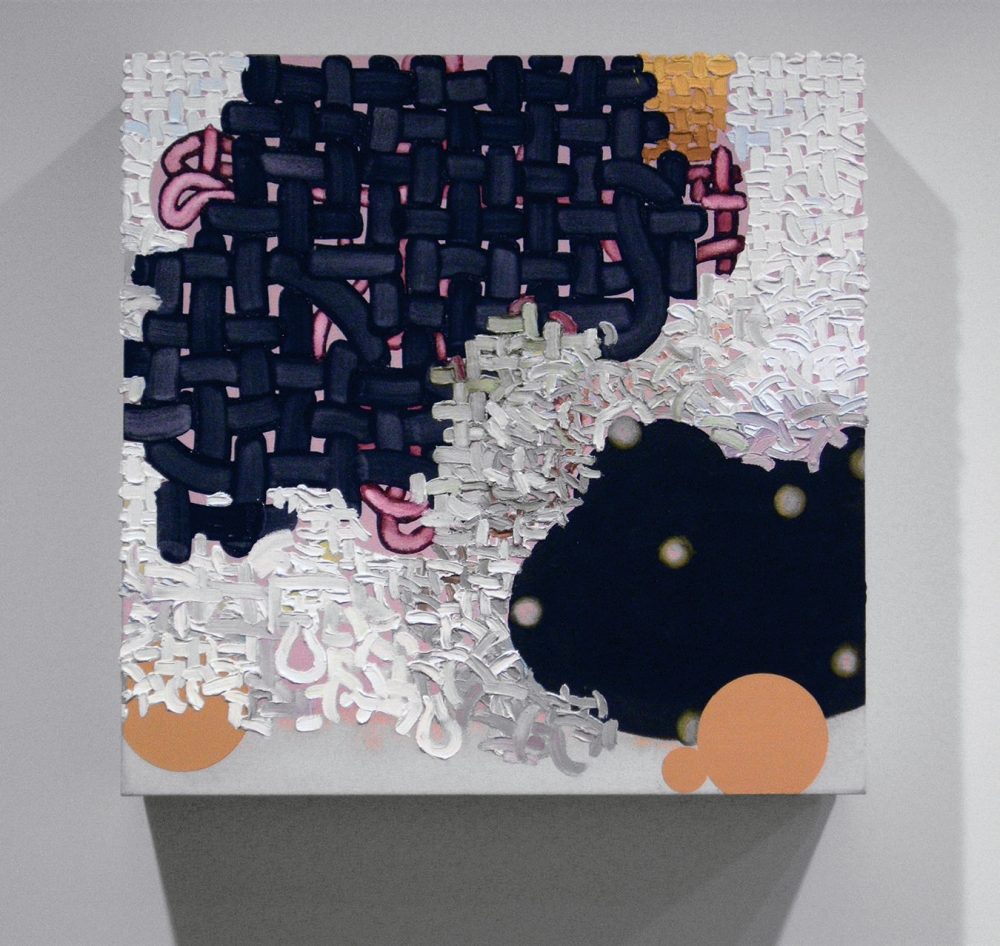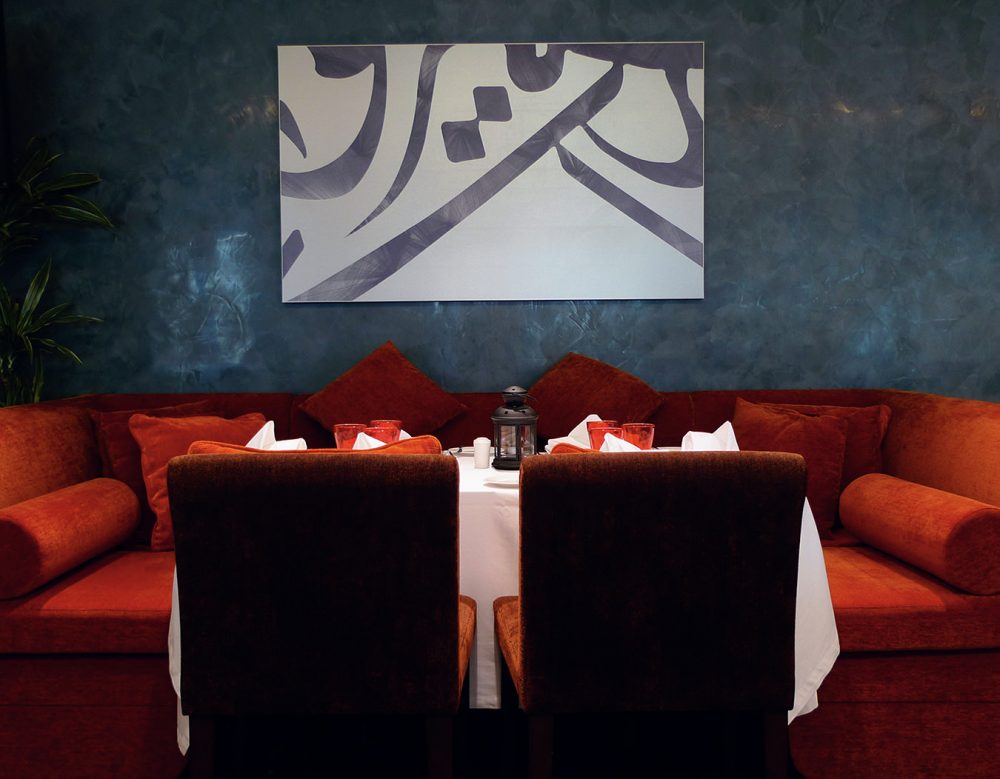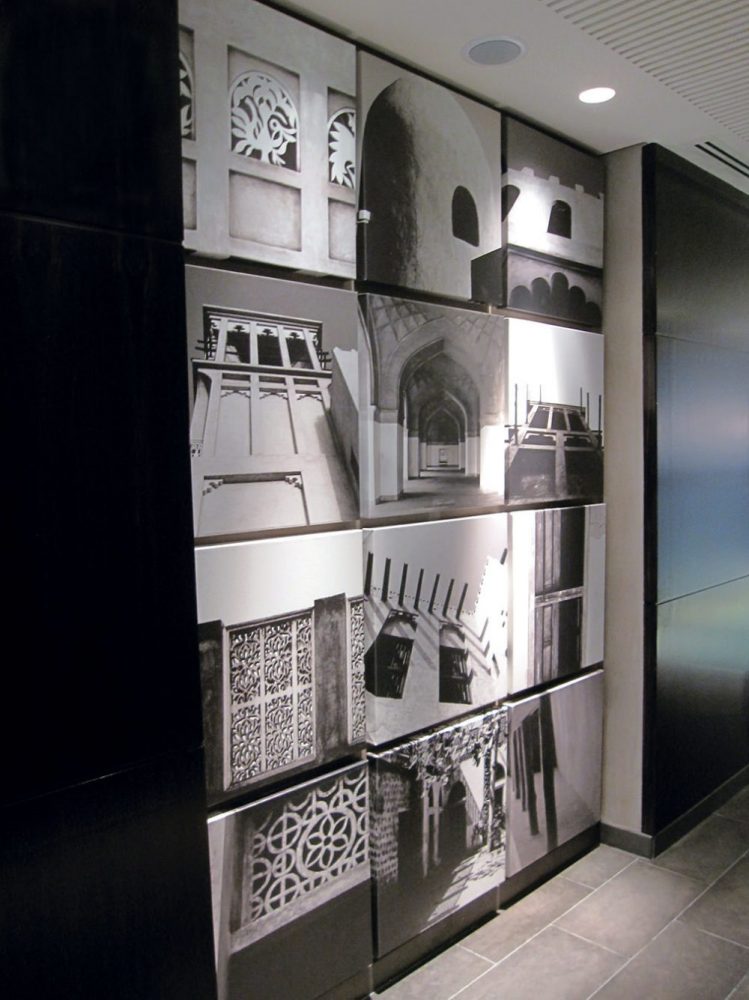From the porte-cochère ascend a chandelier-lit staircase surrounded by mahogany walls into the restored, storied Hotel Georgia and it could be 1927, the building’s year of origin. At first foggy glance, the six Canadian landscapes hung at the top of the stairs seem to confirm that roaring decade when the Group of Seven reigned supreme. Yet climbing closer, something far more contemporary this way comes.
It turns out that bowing evergreen isn’t actually a Tom Thomson at all; his famous Jack Pine has been abstracted into geometric shapes at the hands of digi-doyen Douglas Coupland. On lobby-level walls around the corner are other works by modern masters Alan Wood, Marcel Barbeau, Guido Molinari and Jack Shadbolt. With all these acclaimed Canadian artists under one roof across the way from the Vancouver Art Gallery, one might think this was a satellite, but the curators here are in fact Farmboy Fine Arts, an international art consultancy firm commissioned by the Rosewood hotel group to develop a permanent art collection on site.
The 18 creative folk who make up this Vancouver-based firm cull, commission and create site-specific artworks for hospitality-, healthcare- and corporate-sector clients. Of their 1,500 projects completed since they incorporated in 2000, most are tagged with big names like Hilton, Starwood, Fairmont, and Four Seasons. As a sort of collector-cum-design agency to the brands, they recommend what fine art to acquire, or can provide their own in-house design services to create decorative art, ideally offering a blend of both.
But, before the hotels and even the art is a real farm boy at the reins. Farmboy’s founder, president and creative director is Todd Towers. On this particular occasion, he wears a well-tailored, blush-hued blazer that belies a childhood spent doing farm chores on his family’s fifth-generation cattle ranch outside Red Deer, Alberta. He was the only son, so a Bronc-riding, ranch-running life was assumed. But like a bold Coupland print juxtaposed against a historic hotel wall, Towers had something more unconventional in mind: art school.
His parents agreed, as long as he was near enough to lend a hand at the ranch. At the University of Calgary, he acquired the nickname that would later become incorporated into a business. After finishing his fine arts degree, he opened his own studio, where the idea for Farmboy Fine Arts was cultivated and his rural upbringing reared again.
“I had this collaborative notion of people getting together in a creative environment to exchange ideas,” explains Towers. “It also evokes the sense of my agrarian roots, the idea of working together in partnership. I looked at lending those principles I had growing up on a ranch to the art business. But I thought, ‘Am I the artist or the art dealer?’ The idea that I was going to work objectively for people would not carry much weight if I was just putting my own stuff in everyone’s space. I’d be a one-trick pony.”
Farmboy’s first clients were in the tech industry. Then the dot-com bubble burst. Shortly after, he set his sights on hospitality. Then the World Trade Center towers collapsed, and with them, tourism in North America. The company entered a proverbial blue period. “Those are those times in your life when as a business owner you’re really questioning everything, because people are looking at you going, ‘What the hell are you doing? You’re starving to death. Give it up, get a job.’ But it just wasn’t an option,” Towers says. “I felt this business had opportunity and potential—it just needed the right client to start.”
In 2004, he got the right client, a new W Hotel in South Korea, wrangled with the ballsy determination of a Bronc rider. “I saved up my money, got my butt to Seoul and kind of barged in unannounced,” he recalls. It worked, and Farmboy was formally invited by Higgins Purchasing Group—the company responsible for procuring the W’s furniture and fixtures—to also bid on the accounts for 64 projects over the next five years. In 2009, they landed their biggest deal yet, one that would have them sourcing some 8,000 pieces for Yas Island’s seven Race Day Hotels in Abu Dhabi, where 90 per cent of the artworks would originate from the Arab States of the Persian Gulf.
Prior to that project, in 2006, Farmboy brought in a business partner with a background in investment banking, Tim Gudewill, who credits their success largely with an economy of scale: multiplying made-to-measure decorative art by hundreds of suites. But more clients, like the Rosewood Hotel Georgia, are coming to appreciate the full spectrum of their services, including investment in fine art collections. “When I started the business,” Towers says, “I was always trying to convince people that art was an experience, a greater part of the hotel. Some people really understood that, some people didn’t care. Over the years, we’ve been getting more brands come to us and say they really think that’s important now.”
Towers also recognizes an economic shift in perspective, “With the mortgage and financial crisis a few years ago, there was a massive fall-off in fine art, but it came right back,” he says. “I think people saw that buying a mortgage on paper, never living in that house, was maybe not a good idea. Buying a piece of artwork is like moving some of their investments into some more tangible things.
“You can invest in art and there’s return on it,” he continues. “But I don’t believe that for a hotel you solely buy it for that reason. You want your guests to have an experience with the work. You want them to have a conversation about the piece inside the hotel. You buy it because you love it, but also because there’s an opportunity for it to make you money over time. There are two ways. Those two ways can work together. And I believe this collection will,” he says, referring to the Hotel Georgia.
Its collection, like others, was built on a thematic concept, on-brand but with Farmboy’s curatorial je ne sais quoi. To evoke Rosewood’s brand mantra, “A Sense of Place”, Farmboy envisioned great Canadian artists, and mostly West Coast. To prompt pontification in hotel patrons, they wanted to say something, as art often does, with bolder contemporary works that wouldn’t be wallflowers against hallowed halls.
Alongside the works of Coupland and company, Farmboy also sought out special commissions: an eight-foot-tall encaustic work by Derek Root, a three-part sculpture by David Robinson and a redcedar carving by Ray Natraoro. To realize these, they had buy-in from the hotel based on the artist’s body of work, and they drew on their strong ties with the gallerists and their artists. Every decision is framed in collaboration, just like on the ranch. “When you’re working inside of a hotel, there are so many people involved,” says Towers. “It’s difficult, especially with art, because it’s subjective. People think different things about the way the work should look. We apply our process in a way that allows people to get engaged in the conversation. We vet everyone’s opinion.”
Naturally, Towers is a bit of collector himself, a small-time Gagosian. He recently procured his own Coupland piece, a Molinari too, but with them came the opinion of Towers’s partner, Jasmine. “I’m getting the ‘Todd, you don’t have any wall space right now, you’re storing stuff at the ranch and we have a baby, so what are you doing coming home with a painting?’” Towers says with a laugh. Then comes his admission: “It’s a drug, man. Buying art is a bit of a drug.” And something he gets to do every day.

